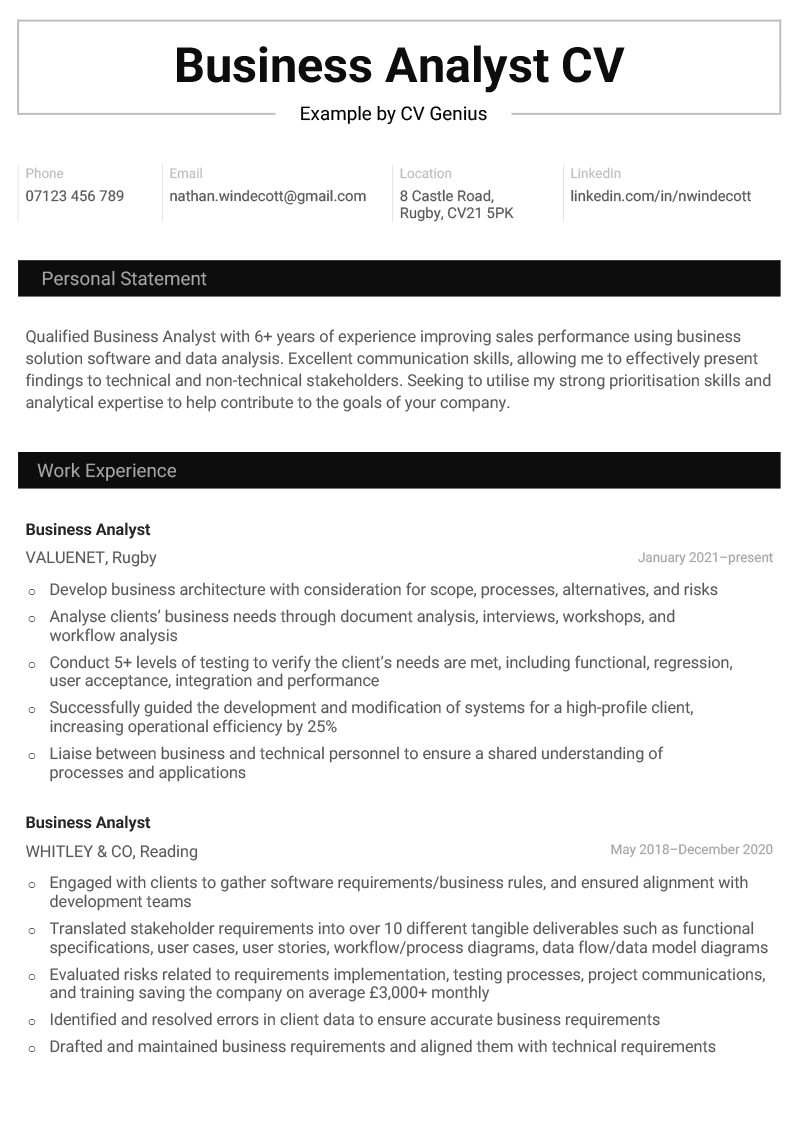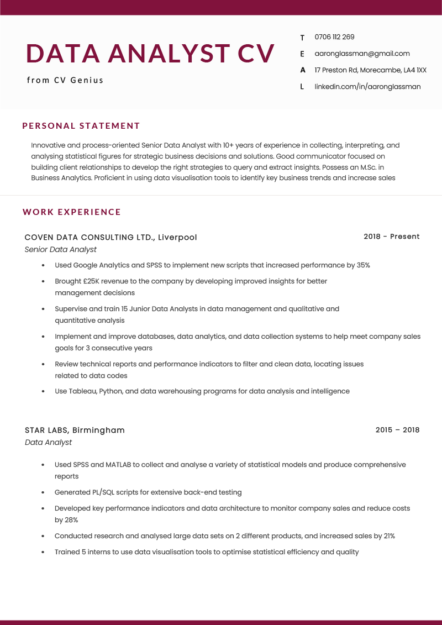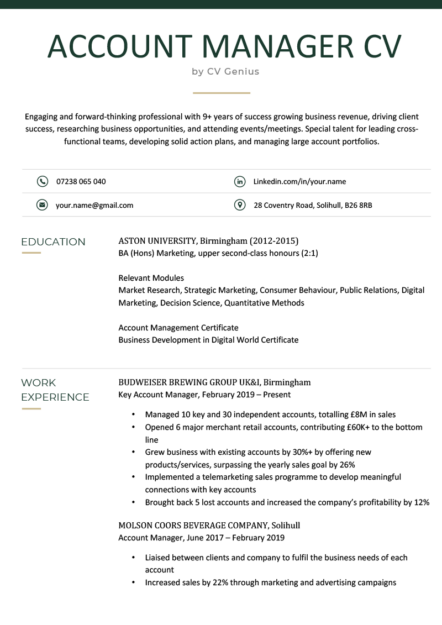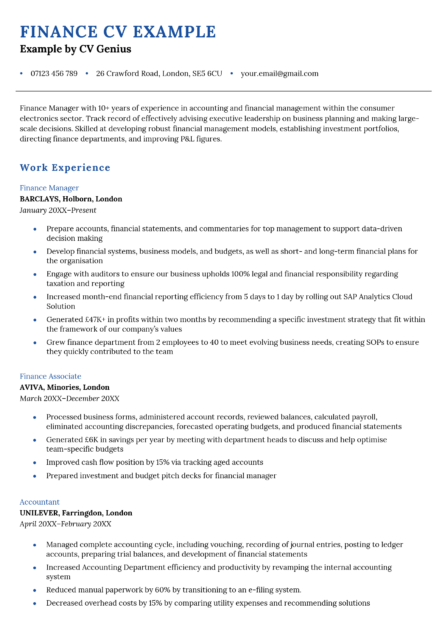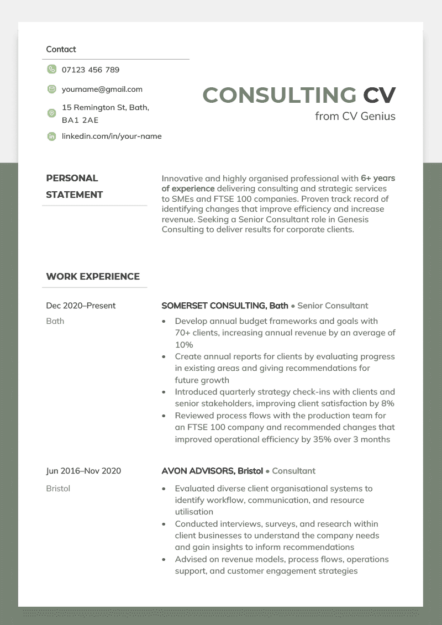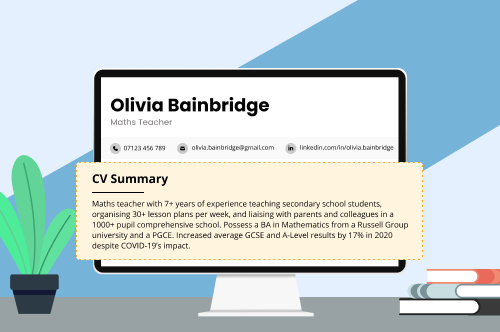Ensure your CV layout is structured to best highlight your unique experience and life situation.
Business Analyst CV Template (Text Format)
PERSONAL STATEMENT
Qualified Business Analyst with 6+ years of experience improving sales performance using business solution software and data analysis. Excellent communication skills, allowing me to effectively present findings to technical and non-technical stakeholders. Seeking to utilise my strong prioritisation skills and analytical expertise to help contribute to the goals of your company.
KEY SKILLS
- Microsoft Office (Word, Excel, Outlook, PowerPoint, Visio)
- Database management systems (Improvado, Microsoft SQL Server)
- Project management software (Wrike and AtTask)
- EDI standards and processing
- Agile software development methodology
WORK EXPERIENCE
VALUENET, Reading
Business Analyst | January 2021 – Present
- Develop business architecture with consideration for scope, processes, alternatives, and risks
- Analyse clients’ business needs through document analysis, interviews, workshops, and workflow analysis
- Conduct 5+ levels of testing to verify the client’s needs are met, including functional, regression, user acceptance, integration and performance
- Successfully guided the development and modification of systems for a high-profile client, increasing operational efficiency by 25%
- Liaise between business and technical personnel to ensure a shared understanding of processes and applications
Whitley & Co., Reading
Business Analyst | May 2018 – December 2020
- Engaged with clients to gather software requirements/business rules, and ensured alignment with development teams
- Translated stakeholder requirements into over 10 different tangible deliverables such as functional specifications, user cases, user stories, workflow/process diagrams, data flow/data model diagrams.
- Evaluated risks related to requirements implementation, testing processes, project communications, and training saving the company on average £3,000+ monthly.
- Identified and resolved errors in client data to ensure accurate business requirements.
- Drafted and maintained business requirements and aligned them with technical requirements.
Reed Accountancy, Guildford
Junior Business Analyst | September 2016 – April 2018
- Assisted Project Manager in analysing business processes and identifying opportunities for improvement
- Gathered and interpreted complex data to inform decision making and drive operational efficiency
- Wrote reports and presentations to effectively communicate findings to stakeholders
- Supported clients with systems configuration and implementation, maintaining customer satisfaction levels of over 90%
EDUCATION
The University of Manchester (2013-2016)
BS in Computer Science (First class honours)
Relevant Modules: Database Systems, Knowledge-based AI, System Architecture, Modelling Data on the Web, Querying Data on the Web
Dissertation Topic: The Value of Data in Risk Management Assessment
King David High School, Manchester (2006-2013)
A-levels: Maths (A), Physics (A), Business Studies (A)
GCSEs: 10 A*-C including Maths, Combined Science, and Design and Technology
HOBBIES & INTERESTS
- Amateur football player
- Spanish cooking
- Movie enthusiast
How to write a powerful business analyst CV
Before you begin writing, make sure you know how to write a CV in a way that best emphasises your strengths.
As a business analyst, you help companies improve their systems and processes, potentially saving them a lot of money. Naturally, these responsibilities mean employers need to know that they can trust you to make sound decisions regarding their business.
The best way to reassure employers that you’re the right person for the job is by learning how to craft a CV that highlights your skills in business analysis.
This guide introduces five ways you can create a CV that impresses employers and helps you get the job you want.
1. Write a detailed personal statement
The business analysis industry is competitive, so you need to do everything you can to stand out. The personal statement on your CV is a great way to catch the attention of employers and introduce some of your more valuable skills.
A personal statement should be 2-4 sentences long and give employers an overview of your profile before they commit to reading your CV.
How you write your personal statement depends on how much experience you have as a business analyst.
Entry level business analyst personal statements
If you’re just starting your career as a business analyst:
- focus on skills you can transfer from your previous jobs or education
- emphasise your passion, goals, and how you want to grow with the company
Here’s an example personal statement from an entry level business analyst CV:
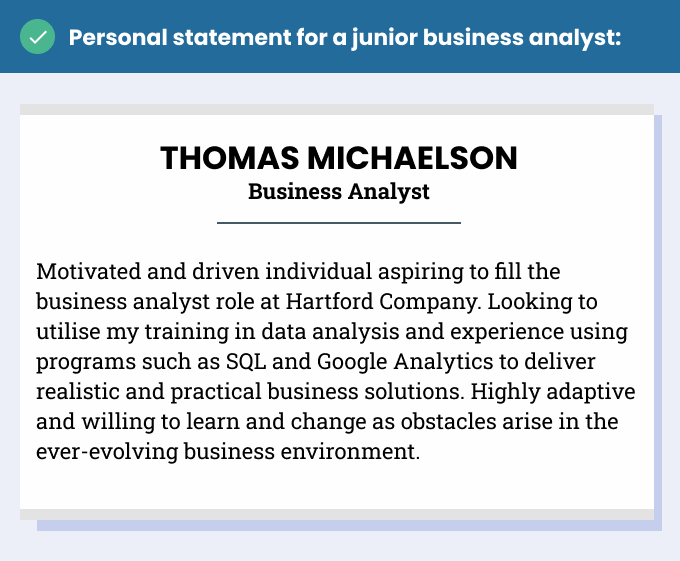
Personal statements for senior business analyst CVs
If you have a few years of experience as a business analyst, you should highlight the following information in your personal statement:
- your achievements, skills, and prior experience as a business analyst
- your career goals, why you want this position, and what you can offer the company
- how your experience and goals align with the requirements of the job posting
Here’s an example of what an experienced business analyst personal statement should look like:
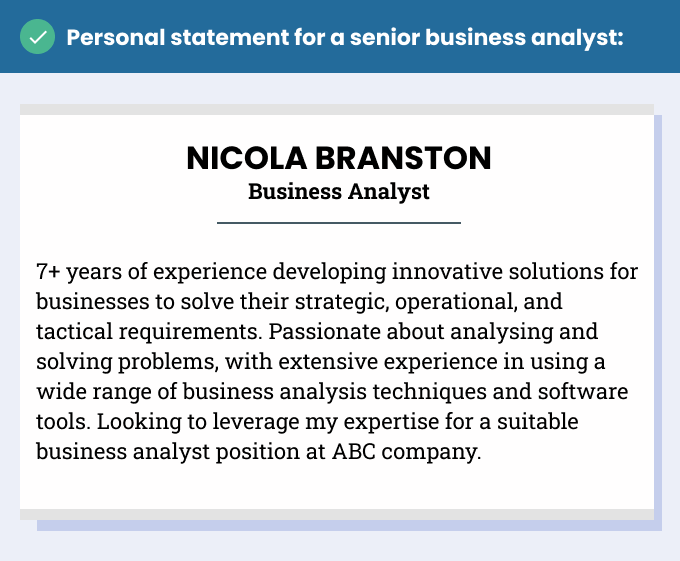
2. Highlight your business analysis skills
Adding the right skills to your CV is crucial for finding work in specialised fields like business analysis. The best way to grab employers’ attention is by showcasing these abilities in the key skills section of your CV. However, every job advert has unique requirements, and every candidate has different work experience, so the skills required will vary.
Here’s the best way to discover the specific skills you should list on your business analyst CV:
- Review the job advert to find which skills are needed
- Think about which of these skills you already possess
- Prepare a list of your relevant skills to list on your business analyst CV. Make sure to list the skills that match the job’s requirements first.
You can also review similar job adverts to identify skills that the employer likely values but didn’t explicitly mention.
You should list 5-10 skills on your CV, so think carefully about which skills you want to highlight.
When choosing skills for your CV, you should include a mix of hard skills and soft skills to show you’re a well-rounded candidate.
Hard skills are job-specific abilities that you learn through training (like data visualisation or cognitive behavioural therapy). The following hard skills look great on a business analyst CV:
- Word processing software (Microsoft 365)
- Database management (Microsoft Access)
- Programming languages (SQL)
- Web analytics (Google Analytics)
- Financial planning
- Budgeting
- Forecasting software (Tableau)
- Variance analysis
- Cost-benefit analysis
- Stakeholder analysis
- Processes modelling
- Business structure knowledge
- Agile methodology
- Project management
- Stakeholder management
- Data analysis
Soft skills are personality-related traits, like communication and people skills. Soft skills are valuable in every industry and enable you to put your technical knowledge to good use.
Employers often seek these soft skills when looking to fill a business analyst position:
- Critical thinking skills
- Management
- Consultation
- Verbal and written communication
- Leadership
- Research
- Adaptability
- Organisation
- Facilitation
- Analytical skills
- Problem solving
- Growth mindset
- Time management
- Active listening
3. Back up your work experience with hard numbers
As a business analyst, your success is measured in hard numbers, whether it’s overall savings or customer satisfaction.
So when employers read your work history section, they’ll immediately scan your bullet points for any numbers that measure your skills and achievements.
Try to include numbers in at least two bullet points for each job entry in your work experience section. Not only will expressing your achievements through numbers make them easier to scan, but it will also make your CV more specific and easier to compare.
Look at these two work experience entries. Which entry do you think does a better job of describing the applicant’s experience?
Work experience entry with hard numbers
Business Analyst,
Parallel, Manchester
June 2018 – January 2022
- Provide analysis and design for 5+ IT projects, informing Support and Development teams to manage configuration of existing systems
- Led requirements gathering for development of a new CRM system, achieving a 10% increase in sales productivity within one year of implementation
- Worked closely with high-profile clients, achieving a 40% increase in user satisfaction between January 2020 and January 2021
- Worked with the development team to ensure that 100% of solutions were delivered on time and within budget
Work experience entry without hard numbers
Business Analyst
Parallel, Manchester
June 2018 – January 2022
- Provide analysis and design for IT projects, informing Support and Development teams to manage configuration of existing systems
- Led requirements gathering for development of a new CRM system, increasing sales productivity
- Worked closely with high-profile clients, boosting user satisfaction
- Worked with the development team to ensure that solutions were delivered on time and within budget
4. List your educational background
If you’re applying for an entry-level or graduate business analyst position, a well-written education section will make a world of difference.
Your CV education section should include:
- the name of the university or institution
- the dates you attended
- your degree title
- honours achieved
- any modules relevant to your career as a business analyst
If you’ve recently graduated and have little or no experience as a business analyst, use a professional CV template that lists your educational background before your work experience, highlighting your relevant modules.
5. Back up your CV with a business analyst cover letter
Communication skills and creativity are crucial traits in a successful business analyst. So it’s important that the employer sees those traits in you when they review your application.
So learn how to write a cover letter that:
- demonstrates your understanding of the role
- expresses a specific interest in the company
- explains how your technical skills and expertise can benefit the hiring team
Use a cover letter builder to quickly organise your knowledge, abilities, and other professional selling points into a convincing and logically structured cover letter.
